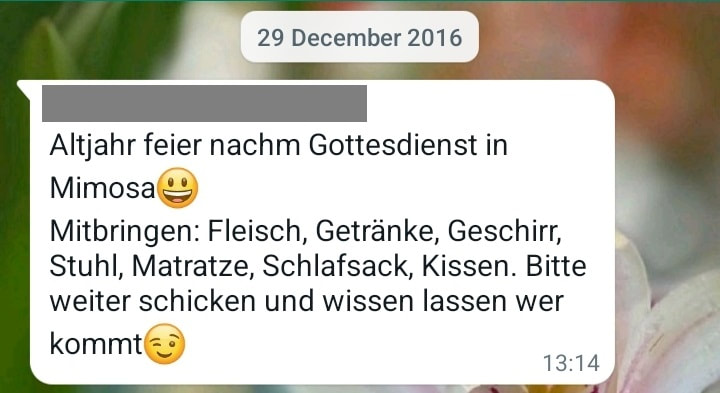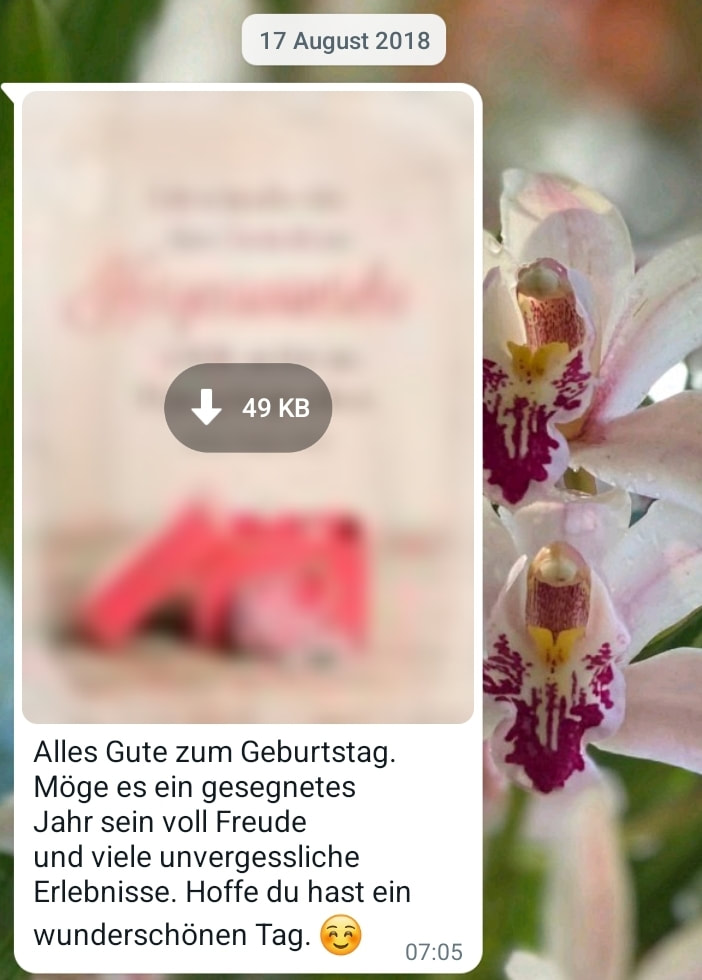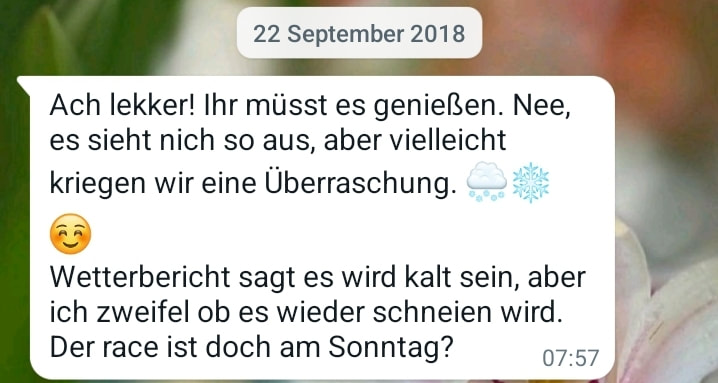|
Download the open access eBook Sixth-generation contact German in South Africa: The case of Kroondal German by clicking here or by scanning the QR code.
All spoken and WhatsApp data cited in the Kroondal German eBook can be found on this webpage. The audio clips and WhatsApp screenshots are longer than the transcribed excerpts in order to provide some context. Go to Spoken Data Go to WhatsApp Data |
Spoken data
|
Example 1:
Wenn Hermann von Erich Besuch kriegte oder sowas, ihre Farmausdrücke waren immer Afrikaans, ich konnte gar nichts verstehen. 'When Hermann had a visit from Erich or something like that, their farm expressions were always Afrikaans, I couldn't understand a word.' |
|
|
Example 2:
Die Farmer haben ihre eigene Sprache. Wir hatten Besuch aus Deutschland und wir haben uns gut unterhalten. Da kam irgendein Farmer dazu, die haben nichts mehr verstanden was gesprochen wurde. 'The farmers have their own language. We had visitors from Germany and we had a good chat. Then some farmer joined in and they [the visitors from Germany] no longer understood anything that was being said.' |
|
|
Example 3:
Mathilde: Und viel hängt von den Frauen ab. Wenn die Frauen noch deutschsprachig sind wird sich's halten. Wenn die alle afrikaanssprachig sind wird's mit der Zeit, so nehme ich an, wird's doch mit der Zeit verwässert werden und wird abdriften zum Afrikaans. Rosa: Man redet nicht umsonst von Muttersprache! Mathilde: 'And a lot depends on the women. While the women are still German-speaking, it (German)'s going to stay. If they all become Afrikaans-speaking, it will over time, I assume, it will become diluted with time and will drift to Afrikaans.' Rosa: 'You don't talk about mother tongue for nothing!' |
|
|
Example 4:
Als ich in Kapstadt war, da, sie reden ja ziemlich gutes Deutsch, und da haben sie nur gesagt, meine Aussprache ist komisch, nur weil ich das, das, das, ja, den Akzent, 'nen anderen Akzent, oder nun dies nicht dies sowie Stern sage, dies, dies spitze 's', und darauf dachten sie's dann ein Sprachfehler. ... Aber das ist wie ich's gelernt hab und so gehört hab. 'When I was in Cape Town, they speak pretty good German there, and they [the Capetonians] just said, my pronunciation is funny, just because I have an accent, another accent, or because I say things like Stern ('star') with that sharp 's', and then they thought it was a speech disorder. ... But this is how I have learnt it and how I have heard it.' |
|
|
Example 6a:
Oh, das ist ein Tourist. Den helfen wir gerne. 'Oh, that's a tourist. We're very happy to help him/her.'gerne. |
|
|
Example 9:
Du glaubst ihm mehr als dem anderen. 'You believe him more than the other one.' |
|
|
Example 13a:
im Vergleich zu normalen Deutsch 'in comparison to normal German' |
|
|
Example 17a:
wenn ihr noch ein Kommentar habt ... 'if you still have any comment ...' |
|
|
Example 18a / Footnote 32i:
Ich hatte im Januar 'ne Freundin aus Deutschland hier und die hat paar Mal gemeint, dass sie mein Papa gar nicht verstehen kann ... 'I had a friend from Germany here in January and she thought a couple of times that she couldn't understand my daddy at all ...' |
|
|
Example 19a:
wenn ich mit Werner oder jemand Deutsch rede ... 'When I speak German with Werner or someone like that ...' |
|
|
Example 20a:
wenn man irgendwo jemand trifft ... 'if you (generic) meet someone somewhere ...' |
|
|
Example 24a:
Simone: Cool. Du kannst gerne deinen Tee trinken. Carola: Oh danke. Es ist noch heiß. Simone: 'Cool, you're welcome to drink your tea.' Carola: 'Oh thanks. It's still hot.' |
|
|
Example 28a:
Da sind ein ganze paar Leute die sich selber als deutsch sehen weil ihre ... ihr Opa deutsch ist. 'There are quite a few people who see themselves as German(s) because their granddad is (a) German.' |
|
|
Example 29a:
... wenn du nur sagst du bist deutsch weil deine Vorfahren deutsch sind ... '... if you only say that you're German because your ancestors are German(s) ...' |
|
|
Example 31a:
Ich finde wenn du die Sprache nicht sprechen kannst und auch nicht irgendwie Traditionen bisschen folgst dann kannst du dich selber nicht ein Deutscher nennen. 'I find that when you can't speak the language and also follow the traditions at least a little, then you can't label yourself as a German.' |
|
|
Example 34:
Ich hatte im Januar 'ne Freundin aus Deutschland hier und die hat paar Mal gemeint, dass sie mein Papa gar nicht verstehen kann ... 'I had a friend from Germany here in January and she thought a couple of times that she couldn’t understand my daddy at all ...' |
|
|
Example 50a:
Es ist meist bibelriche Bücher die ich dann noch in Deutsch hab. 'It's mostly biblical books that I still have in German.' |
|
|
Example 51a:
Dann sagen sie, das ist nicht eigentlich Wörter die sie kennen. 'Then they say those aren't really words that they know.' |
|
|
Example 55a:
dann wird ich wieder in Deutschland gehn besuchen, '... then I will make visits in Germany again.' |
|
|
Example 64a:
... wenn du auf einmal hier hoch so Hochdeutsch in einer Gruppe mit Kroondalern redest, dann werden alle dich wahrscheinlich bisschen auslachen. 'If you speak High German here with a group of Kroondalers, then they will probably all laugh at you a little.' |
|
|
Example 65a:
Ich wollte schon immer Spanisch sprechen, also ich denk meine Kinder gehn Spanisch lernen. 'I always wanted to learn Spanish, so I think that my children are going to learn Spanish.' |
|
|
Example 99a:
Wie sie [die Deutschen] anziehen die Sand- die Strümpfe mit Sandalen sind noch al ein- ein dead give-away. 'The way the Germans wear sandals with socks is rather a dead give-away.' |
|
|
Example 101a:
Da entwickelt es [das Deutsch] weiter in eine andere Richtung und hier entwickelt es auch. 'There it evolves in a different direction and here it also evolves.' |
|
|
Example 103a:
Ich hab nicht Lust Mühe zu tun. 'I don't feel like making an effort.' |
|
|
Example 116a:
Wie ich in Deutschland gearbeitet hab ... 'When I worked in Germany ...' |
|
|
Example 127a:
Für uns fällt es nicht so dolle auf. 'For us, it wasn't so obvious.' |
|
|
Example 128a:
Das ist für mich manchmal schade. 'That sometimes seems a pity to me.' |
|
|
Example 143:
Wenn Hermann von Erich Besuch kriegte oder sowas, ihre Farmausdrücke waren immer Afrikaans ... 'When Hermann had a visit from Erich or something like that, their farm expressions were always Afrikaans ...' |
|
|
Example 144a:
Ja, und dann die Feste waren auch immer alle so schön. 'Yes, and then the festivals were all also always so great.' |
|
|
Example 144b:
... deswegen man wird nicht forciert um richtiges [Deutsch] zu sprechen. '... therefore one isn't forced to speak proper German.' |
|
|
Example 144c:
... und so sie haben beide ne feste Arbeit ne gute Arbeit. '... and so they both have a regular job, a good job.' |
|
|
Example 147a:
Sie kriegen denn auch nicht ein Work Permit. 'Then they also don't get a work permit.' |
|
|
Example 148a:
Das ist nicht ein Wort, was sie kennen. 'That isn't a word which they know.' |
|
|
Example 152:
Hedwig: Unsere Sprache ist etwas altmodisch im Vergleich zu den neuen Deutschen in Deutschland. Rosemarie: Ja, Gott sei Dank! Maria: Ja, bei uns ist noch nicht alles geil und so weiter. Hedwig: 'Our language is somewhat old-fashioned in comparison to the new [i.e. contemporary] Germans in Germany.' Rosemarie: 'Yes, thank goodness!' Maria: 'Yes, with us, not everything is yet geil ['cool'] and so on.' |
|
|
Example 154:
Die Busse, die einzigsten womit ich fahren würde, ist die Gautrain Busse. 'The only buses I would travel with are the Gautrain buses.' |
|
|
Example 157a:
Es ist noch all so, die meisten Deutschen lernt man durch die Kirche kennen. 'It's really the case that one gets to know most Germans through the church.' |
|
WhatsApp data
To preserve anonymity, names have been deleted.














